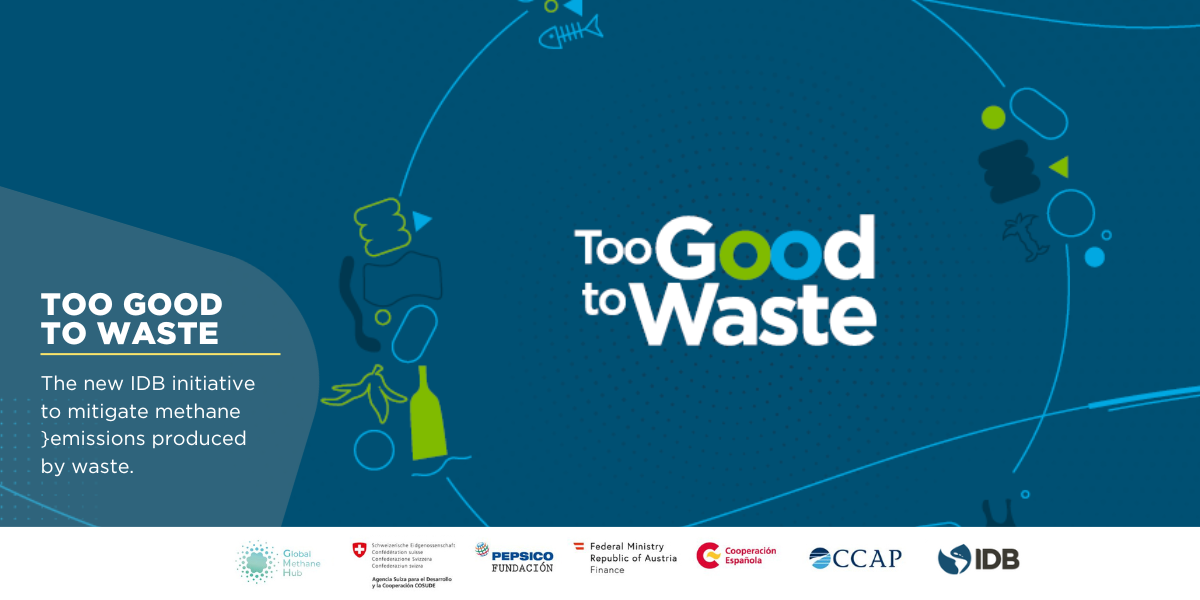The Inter-American Development Bank (IDB) is launching its Too Good To Waste initiative to accelerate the implementation of solid waste management projects in Latin America and the Caribbean (LAC) to mitigate the associated methane emissions.
This initiative, approved by the IDB Board of Directors on October 6, is financially supported by the Global Methane Hub and the Aquafund multi-donor fund, and is expected to contribute to the reduction of at least 30% of methane emissions in solid waste operations financed by the Bank, in line with the objective of the Global Methane Pledge.
All IDB borrowing countries are eligible to participate in this regional initiative. The activities to be financed with non-reimbursable resources are:
- Structuring bankable solid waste management projects with concrete results in methane reduction.
- Generating financial instruments and leveraging revenues for waste management projects.
- Monitoring and verification of methane emissions mitigation.
- And capacity building and knowledge dissemination.
The Too Good to Waste initiative will be executed jointly by the IDB and the Center for Clean Air Policy (CCAP), in order to generate synergies with the Recyclo Organicos funded by the Government of Canada and the Global Methane Hub.
Too Good to Waste, an initiative in line with the Paris Agreement
Starting in 2023, the IDB committed to align all its lending operations to the Paris Agreement. With only 7 years to go until 2030, actions with immediate results are required. It is in this scenario that it is essential to accelerate the mitigation of greenhouse gases (GHG), with high global warming potential.
Mitigation of methane emissions is a crucial strategy given that these have doubled since pre-industrial times, and methane has a higher global warming potential (80 times) compared to carbon dioxide. Moreover, the results can be achieved in a cost-effective manner.
Waste sector is key to methane mitigation
Solid waste and wastewater management is the third sector responsible for methane emissions generation in the world (20%), after agriculture (40%) and fossil fuel production (35%).
In waste management, methane is produced due to: (i) the growing generation of waste, especially organic waste, attributable to food loss and waste; (ii) inadequate solid waste management, with low recovery rates, lack of differentiated management, uncontrolled burning and inadequate final disposal; and (iii) the lack of biogas extraction systems in landfills and dumps.
In LAC, the region generated 230 million tons of municipal solid waste in 2021, equivalent to approximately 13% of global waste. According to the Solid Waste and Circular Economy Hub, which is managed by the IDB, more than 40% of the region’s municipal solid waste was sent to inadequate landfills, burned or left in bodies of water. Forty-five percent of municipal solid waste was disposed of in sanitary landfills (many of them without active biogas capture systems) and only 4% was used. The waste sector in LAC released more than 345 million tons of GHGs -mainly methane- into the atmosphere.
In addition, several studies using satellite technology show that methane emissions at the urban level are between 1.4 and 2.6 times higher than the levels recorded in national emissions inventories, and final disposal sites account for up to 50% of these emissions.
Solutions to reduce methane emissions involve improving solid waste management and moving towards a circular economy model, including:
- reducing the generation of organic waste, both in food production processes and consumption, and composting waste at home.
- In the solid waste collection service, it is a priority to implement differentiated collection of organic waste, for this people must separate this waste at home, and municipalities and operators must provide a separate collection route and treatment options.
- Existing landfills should install systems to capture methane and if possible, use it as vehicle fuel, or in nearby industries or to generate electricity.
- It is urgent to close open dumps and other inadequate sites that still exist in the region.
The IDB estimates that in LAC there is still a financial gap of US$4.25 billion per year to increase the use of waste to 30%, eliminate inadequate final disposal, and achieve universal collection coverage.
Attend the launch of the initiative
The launch of the Too Good to Waste initiative will take place on October 24, 2023 at 13:45 p.m. (GMT-5) as part of the Latin American and Caribbean Climate Week (LACCW 2023) in Panama City. The regional climate weeks, organized by the United Nations and the government of the host country, allow governments, organizations, development banks, society, and others to engage in synergies for climate action in the region. It is a preparatory space for COP28 to be held in the UAE in December 2023.
For those attending the event in person, you can go to the Action Hub room of the Marriott Panama Hotel and virtually you can go to the events agenda and select the online link.


Me encanta la iniciativa. Estoy experto en cambio climático y gestión de residuos. Me gustaría una oportunidad de aplicar mis conocimientos en alguna consultoría relacionada.